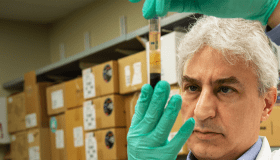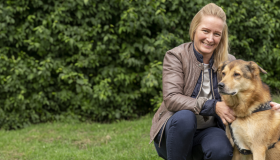May 10, 2016 – Randy Walker of eastern Tennessee was looking for a competition roping horse for his son, Johnny, and Caddy fit the bill. She was a beautiful gray quarter horse mare and a champion competitor. When Randy went to pick up Caddy, he noted a small knot on her head, but was assured it was nothing. But Randy was concerned. When a friend thought the bump might be cancer, Randy called his veterinarian who referred him to Dr. Jeffrey Phillips, a face of hope for owners whose horses are diagnosed with cancer.
“For too long, veterinarians have advised watchful waiting as a treatment option for cancer in horses,” said Dr. Phillips, an assistant professor of oncology and medical genetics at Lincoln Memorial University in Tennessee. “This has never made sense to me. Would we ignore a mass on ourselves?”
Melanoma is one of the most common type of skin tumors found on horses. This form of cancer is especially prevalent in gray horses, reaching an incidence rate up to 80 percent. The tumors, which can be benign or malignant, often are advanced by the time they are diagnosed, and can result in prolonged and significant discomfort for affected horses.
Dr. Phillips was unsatisfied with the wait and see approach, and set out to find practical ways to treat horses with cancer. He turned his focus to the treatment of melanoma in horses. He made an interesting proposal – use a recently developed canine melanoma vaccine to treat horses with melanoma. Dr. Phillips devised a treatment protocol for horses, and received a grant from Morris Animal Foundation for a clinical trial.
His study was a stunning success. He was able to show dramatic shrinkage of tumors in the majority of horses in the study (15 horses were enrolled in the initial study), and arrested tumor growth in the remaining patients. The horses also developed antitumor immune responses following vaccination. Many of the original study horses still are receiving periodic treatment, and are living active lives despite their cancer. Dr. Phillips’ results are providing hope to thousands of owners whose horses struggle with this debilitating cancer. Randy Walker is one such owner.
“Our veterinarian referred us to Dr. Phillips and his study,” said Randy. “I took my son to the appointment, since Caddy was his horse. It was tough for Johnny to hear that she had cancer, but he came along on all her treatments.”
Cancer didn’t slow the pair down. They continued to compete and win for the next three years, all while Caddy was getting melanoma vaccine injections.
“She would go right from an appointment to a competition,” said Randy. “That was the cool thing about the treatment; it never slowed her down. Her quality of life has been awesome.”
Randy also was impressed with Dr. Phillips and his team.
“The neat part about the whole deal for us was the relationship we developed with all the people involved in the study,” said Randy, who has been sharing his experience with everyone he can. “At first, I didn’t want to tell anybody about Caddy’s cancer. Then I started talking about it, and everyone was interested in knowing what we were doing and how the treatment was going.”
Caddy continues to compete at the highest levels. Her experience is an inspiration to all who know and care for her, giving hope to others who have cherished horses with cancer. For horses and other companion animals, Morris Animal Foundation continues to invest in cancer research that is saving lives.




